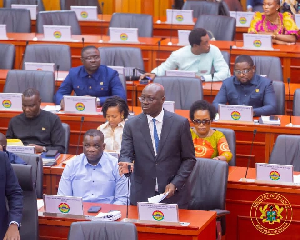The Western Regional Coordinating Council and National Youth Authority in collaboration with United Nations Population Fund (UNFPA) have organised a day's training workshop on Gender responsiveness, sexual reproductive and health right (SRHR) for youth leaders at Daboase in the Wassa-East district.
The workshop, which was attended by youth and club leaders drawn from Ahanta West and Wassa East districts, educated the leaders on gender and sexual reproductive health rights for them to replicate their training to the younger people in their respective communities.
Madam Mirabel Okine, the Acting Regional Director for Gender Department speaking on the subject, said gender responsiveness was aimed at mainstreaming gender concerns into sexual reproductive health, and that gender responsiveness was not a separate provision for women, but a general provision that is planned, approved, monitored and audited in a gender-sensitive way.
She added, that gender as defined by society brought about disparities in roles, making them sex-specific, which ought not to be so.
Bridging the gap of gender inequality, Madam Okine stressed, that a woman could equally undertake difficult tasks that have been labelled as a job for the man.
In this regard, she advised the youth to be independent and desist from depending on guys for monetary and material needs and be content with the little they had.
Attributing sexual reproductive issues to poverty, Madam Okine cautioned that it should never be an excuse for young girls to start sleeping around just to support themselves and advised that in poverty-stricken cases, victims should contact extended family members for assistance or possibly seek help from the social welfare department.
The Acting Regional Director for Gender said: "regardless of how we think, children are sexually active therefore we should sit them down and educate them on sexual reproductive health in order to avoid teenage pregnancies, unsafe abortion, mental health and STI's".
Dr Kofi Sutherland, Wassa East District Health Director said in defining gender roles, boys were equally supposed to be taught how to cook, wash and do other house chores, stressing that roles were not gender specific.
"Adolescents need education on sexual reproduction and health because knowing will help them in utilising the methods they have been taught effectively", he said.
To this effect, adolescents should be engaged in health and counselling sessions in schools.
Mr. Sutherland stressed the need for society to be allowed in the correction of children who go wayward and not term it as child abuse.
He said females should be taken through sexual reproductive health education immediately they start menstruation to enable them to deduce right from wrong and protect themselves accordingly.
He explained that knowing the causes of teenage pregnancy would help to prevent young girls to continue that cycle, adding that they should also be provided with a safe environment, where they could present their problems and seek for a solution.
He urged parents to make it a point to know the friends of their wards so that they would know the sort of influence they were receiving outside the home.
Dr Sutherland stated that of all the contraceptive methods, it was advisable to use condom since it helped to prevent STI.
He, however, noted that the best form of protection was abstinence, but in situations that they still wanted to have sex, condom should be used.
Mr. Anthony Baah, the Acting Regional Director for National Youth Authority also expressed concern on how girls who are knowledgeable on sex-related issues were branded as promiscuous and explained, that such information was key in organising young people to be more responsible and add value to themselves.
He, therefore, appealed to the MMDA's to factor sexual reproductive health programmes in their budget.
Health News of Sunday, 16 June 2019
Source: ghananewsagency.org













